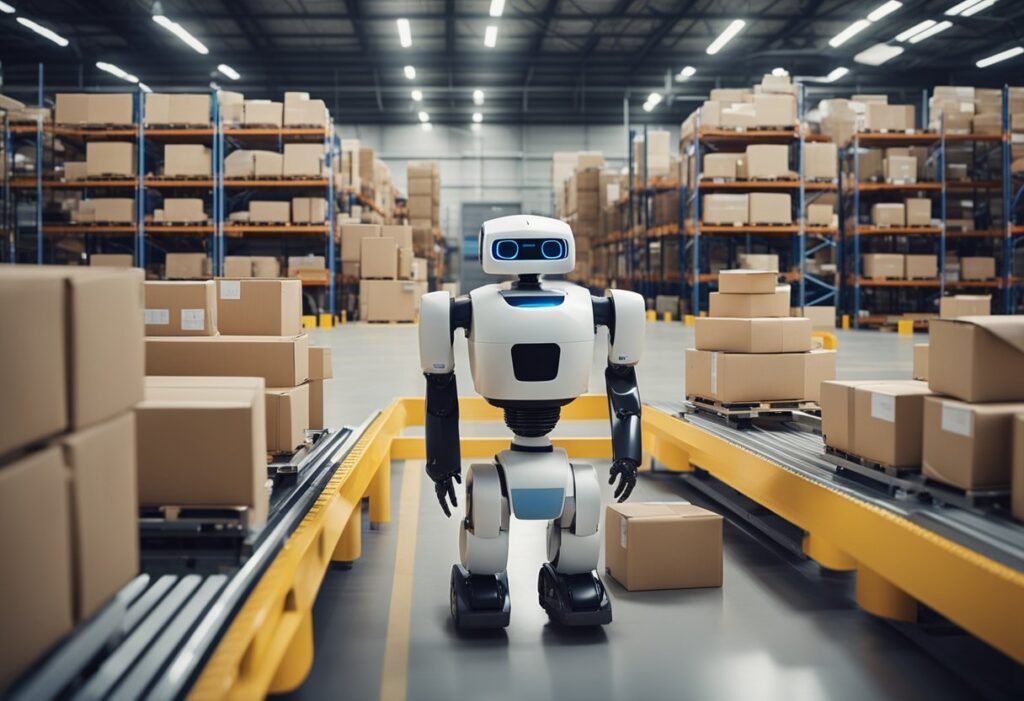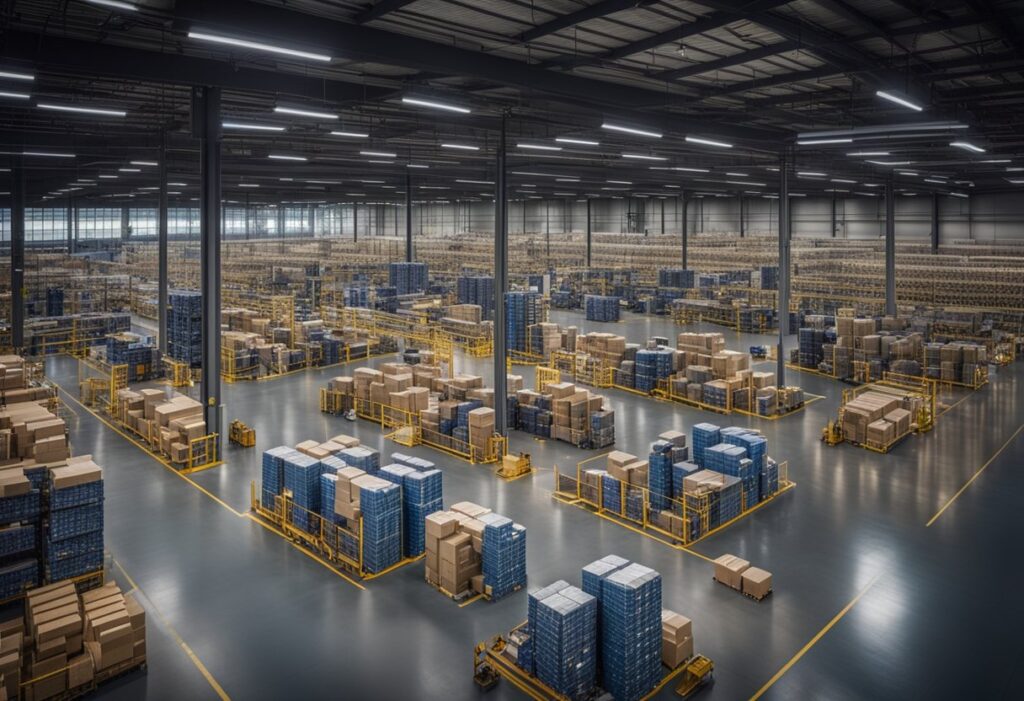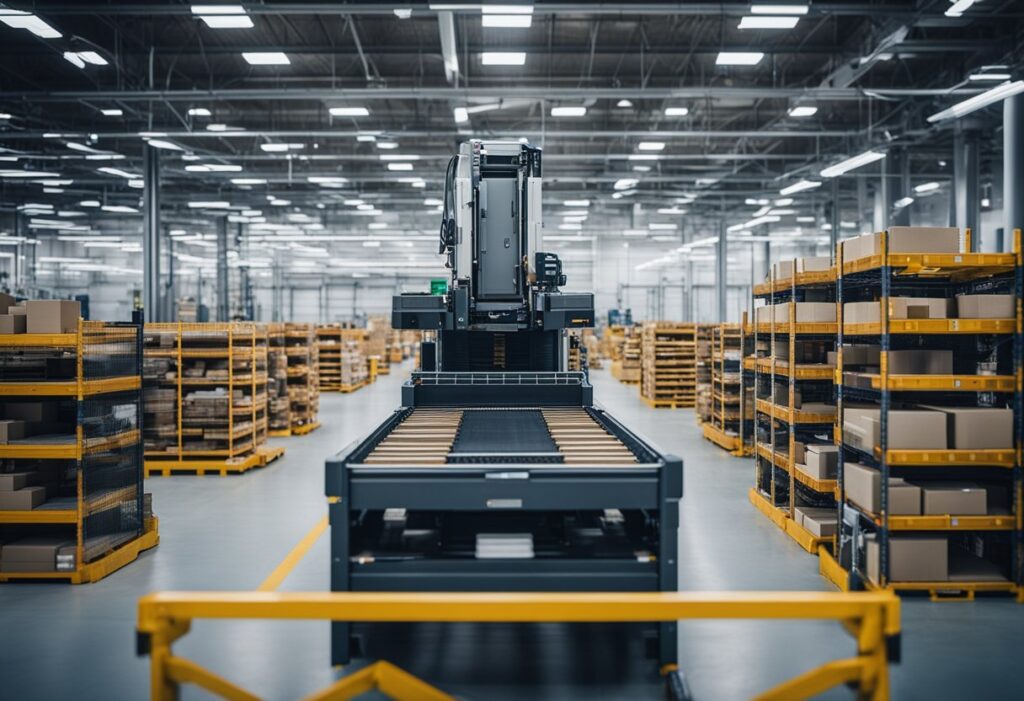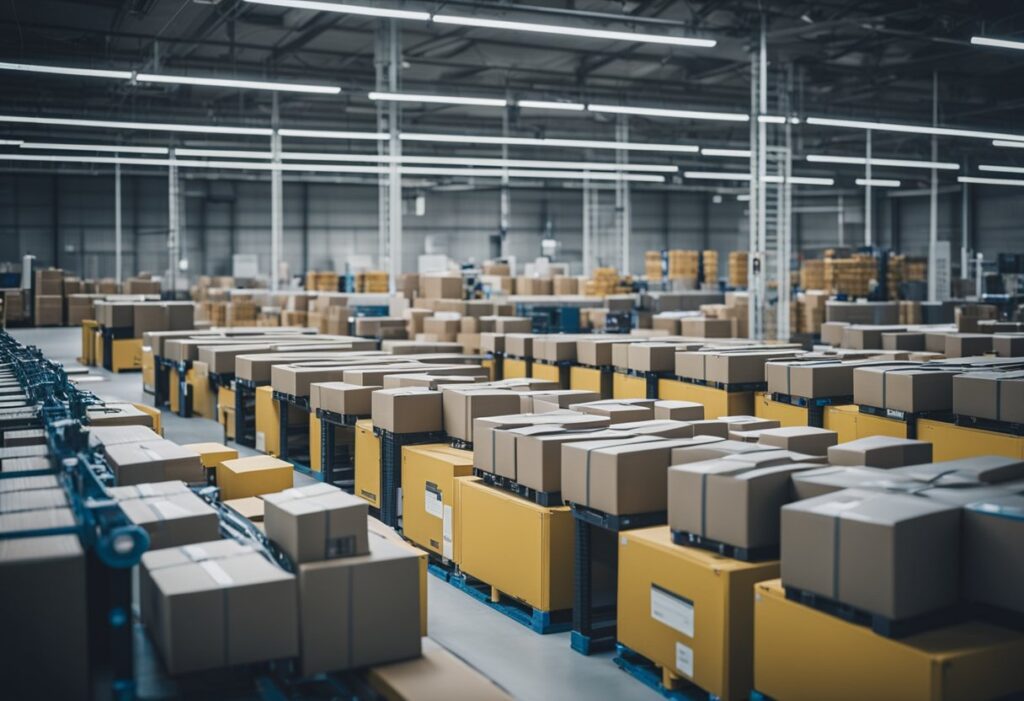Logistics is a critical component of any business, and with the rise of e-commerce, the demand for efficient and effective logistics has never been higher. One way that companies are meeting this demand is by leveraging artificial intelligence (AI) solutions. AI can help businesses optimize their logistics operations, reduce costs, and improve customer satisfaction.

Enterprise AI solutions for logistics involve using AI technologies to enhance operational excellence throughout the supply chain. This includes data collection and preparation, selecting the right AI technologies, building and integrating the AI model, addressing ethical and bias concerns, implementing and deploying the solution, and measuring success and ROI. By embracing AI solutions, businesses can streamline and automate many elements of logistics operations, resulting in greater efficiency. AI-powered solutions use technologies such as natural language processing (NLP) and machine learning (ML) to understand and assess data on a massive scale and speed.
Overview of Enterprise AI in Logistics

In recent years, the logistics industry has been transformed by the integration of artificial intelligence (AI) solutions. These solutions have enabled logistics companies to optimize their operations, reduce costs, and improve customer satisfaction.
AI-powered logistics solutions can range from route optimization and demand forecasting to inventory management and warehouse automation. By leveraging advanced technologies such as machine learning, natural language processing, and computer vision, logistics companies can automate processes, gain insights, and make data-driven decisions within their operations.
One of the key benefits of enterprise AI solutions in logistics is the ability to enhance operational excellence. By automating repetitive tasks, AI-powered systems can free up human resources to focus on more complex and strategic tasks. This can lead to increased productivity and efficiency, as well as improved accuracy and reduced errors.
Another benefit of enterprise AI solutions in logistics is the ability to improve customer satisfaction. By leveraging data analytics and machine learning, logistics companies can gain insights into customer behavior and preferences, enabling them to provide more personalized and efficient services. This can lead to increased customer loyalty and retention, as well as improved brand reputation.
Overall, the integration of enterprise AI solutions in logistics has the potential to revolutionize the industry, leading to increased efficiency, reduced costs, and improved customer satisfaction. As such, it is becoming increasingly important for logistics companies to explore and adopt these technologies in order to remain competitive in the market.
Key Technologies Driving AI in Logistics

The logistics industry has been transformed by the advent of artificial intelligence (AI) and its various applications. AI, along with machine learning (ML), natural language processing (NLP), robotics, and the Internet of Things (IoT), has enabled logistics companies to streamline their operations and improve their services. In this section, we will explore some of the key technologies driving AI in logistics.
Machine Learning and Predictive Analytics
Machine learning algorithms are used to analyze large amounts of data to identify patterns and insights that can be used to make predictions. Predictive analytics is a subset of machine learning that uses these insights to forecast future trends. In logistics, machine learning and predictive analytics can be used to optimize routes, predict demand, and forecast delivery times.
Natural Language Processing for Enhanced Communication
Natural language processing (NLP) is a branch of AI that enables computers to understand human language. NLP can be used to improve communication between logistics companies and their customers. For example, chatbots can be used to provide customers with real-time updates on their shipments, answer their queries, and resolve their issues.
Robotics and Automation
Robotics and automation are transforming the logistics industry by enabling companies to automate their operations. Robots can be used to pick and pack products, load and unload trucks, and even deliver packages. Automation can also be used to optimize warehouse operations, reduce errors, and improve efficiency.
IoT and Real-Time Data
The Internet of Things (IoT) refers to the network of devices that are connected to the internet and can communicate with each other. In logistics, IoT devices can be used to track shipments, monitor inventory levels, and optimize routes. Real-time data can be used to make better decisions, improve efficiency, and reduce costs.
In conclusion, the logistics industry is being transformed by AI and its various applications. Machine learning, NLP, robotics, and IoT are just a few of the key technologies driving AI in logistics. These technologies are enabling logistics companies to enhance their operational excellence, improve their services, and provide better customer experiences.
Benefits of AI Solutions in Logistics

Artificial Intelligence (AI) is transforming the logistics industry by enabling logistics companies to optimize their operations, improve supply chain visibility, enhance customer experience, and increase operational efficiency. In this section, we will discuss some of the benefits of AI solutions in logistics.
Optimized Inventory Management
AI solutions can help logistics companies optimize their inventory management by providing real-time data on inventory levels, demand, and supply. This data can be used to forecast demand, optimize stock levels, and reduce the risk of stockouts. AI-powered inventory management systems can also help reduce inventory costs by identifying slow-moving items and suggesting ways to reduce excess inventory.
Improved Supply Chain Visibility
AI solutions can provide real-time visibility into the supply chain, enabling logistics companies to track shipments, monitor inventory levels, and identify potential bottlenecks. This increased visibility can help logistics companies make better decisions, improve customer service, and reduce costs.
Enhanced Customer Experience
AI solutions can help logistics companies enhance the customer experience by providing real-time tracking information, personalized recommendations, and proactive notifications. This can help improve customer satisfaction, increase loyalty, and reduce customer churn.
Increased Operational Efficiency
AI solutions can help logistics companies increase operational efficiency by automating repetitive tasks, optimizing routes, and reducing errors. This can help reduce costs, improve productivity, and increase profitability. AI-powered logistics solutions can also help improve safety by identifying potential hazards and suggesting ways to reduce risks.
In summary, AI solutions are transforming the logistics industry by enabling logistics companies to optimize their operations, improve supply chain visibility, enhance customer experience, and increase operational efficiency. By leveraging AI solutions, logistics companies can gain a competitive advantage, reduce costs, and improve their bottom line.
Implementation Strategies for AI in Logistics

Logistics companies can benefit from implementing AI solutions to enhance operational excellence. However, implementing AI solutions can be complex and require a well-planned strategy. Here are some implementation strategies for AI in logistics:
Identifying Business Needs and Goals
The first step in implementing AI solutions is to identify the business needs and goals. Companies should evaluate their current processes and identify areas where AI solutions can improve efficiency and productivity. For example, AI solutions can be used to optimize route planning, automate warehouse operations, and improve demand forecasting. Companies should also set specific goals for the AI implementation, such as reducing delivery times or increasing inventory accuracy.
Selecting the Right AI Solutions
Once the business needs and goals have been identified, companies should select the right AI solutions. There are many AI solutions available for logistics companies, such as machine learning algorithms, natural language processing, and computer vision. Companies should evaluate different solutions and select the ones that best fit their needs and goals. It is also important to consider factors such as cost, scalability, and ease of integration.
Integration with Existing Systems
AI solutions should be integrated with existing systems to ensure seamless operation. Companies should evaluate their current systems and identify any potential integration challenges. They should also consider the data requirements and ensure that the AI solutions can access the necessary data. Integration with existing systems should be done in a phased manner to minimize disruption to operations.
Workforce Training and Change Management
The successful implementation of AI solutions requires workforce training and change management. Companies should provide training to employees to ensure that they are familiar with the new systems and processes. They should also communicate the benefits of the AI implementation and address any concerns that employees may have. Change management should be done in a phased manner to ensure a smooth transition.
In conclusion, implementing AI solutions can enhance operational excellence for logistics companies. However, it requires a well-planned strategy and a phased approach. Companies should identify their business needs and goals, select the right AI solutions, integrate them with existing systems, and provide workforce training and change management.
Challenges and Considerations

When implementing enterprise AI solutions for logistics, there are several challenges and considerations that need to be taken into account. These include data privacy and security, regulatory compliance, scalability and flexibility, and cost management.
Data Privacy and Security
One of the main concerns when implementing AI solutions for logistics is data privacy and security. Logistics companies deal with sensitive information such as customer data, financial information, and trade secrets. Therefore, it is important to ensure that the data is protected from unauthorized access, theft, or misuse.
To address these concerns, logistics companies need to implement robust security measures such as encryption, access controls, and intrusion detection systems. They also need to ensure that the AI solutions they use are compliant with data privacy regulations such as the General Data Protection Regulation (GDPR) and the California Consumer Privacy Act (CCPA).
Regulatory Compliance
Another challenge when implementing AI solutions for logistics is regulatory compliance. Logistics companies need to comply with various regulations such as the International Traffic in Arms Regulations (ITAR), the Export Administration Regulations (EAR), and the Customs-Trade Partnership Against Terrorism (C-TPAT).
AI solutions can help logistics companies comply with these regulations by automating compliance checks and monitoring. However, it is important to ensure that the AI solutions used are compliant with the regulations themselves.
Scalability and Flexibility
Scalability and flexibility are also important considerations when implementing AI solutions for logistics. Logistics companies deal with large amounts of data and need to be able to scale their AI solutions to handle this data. They also need to be able to adapt their AI solutions to changing business needs and requirements.
To address these concerns, logistics companies need to implement AI solutions that are scalable and flexible. This can be achieved by using cloud-based solutions that can be easily scaled up or down as needed. It is also important to choose AI solutions that can be easily integrated with existing systems and workflows.
Cost Management
Finally, cost management is another important consideration when implementing AI solutions for logistics. AI solutions can be expensive to implement and maintain, and logistics companies need to ensure that they are getting a good return on investment.
To address these concerns, logistics companies need to carefully evaluate the costs and benefits of implementing AI solutions. They also need to consider factors such as the cost of hardware, software, and personnel needed to manage the AI solutions. It is important to choose AI solutions that provide a good return on investment and can help reduce costs in the long run.
Future Trends in AI for Logistics

As the world of logistics continues to evolve, it is becoming increasingly apparent that AI will play a significant role in the industry’s future. Here are some of the trends that are expected to shape the future of AI in logistics:
1. Increased Automation
One of the most significant trends in AI for logistics is the increased automation of various processes. This includes everything from inventory management to route optimization. By leveraging AI and machine learning algorithms, logistics companies can automate many of the repetitive tasks that are currently performed by humans. This not only helps to improve efficiency but also reduces the risk of errors.
2. Predictive Analytics
Another trend that is expected to shape the future of AI in logistics is the increased use of predictive analytics. By analyzing historical and real-time data, logistics companies can gain insights into trends and patterns that can help them make better decisions. For example, predictive analytics can help logistics companies anticipate demand, optimize inventory levels, and identify potential bottlenecks in the supply chain.
3. Improved Visibility
AI is also expected to play a significant role in improving visibility in the logistics industry. By leveraging technologies such as the Internet of Things (IoT) and blockchain, logistics companies can gain real-time visibility into their operations. This can help them track shipments, monitor inventory levels, and identify potential issues before they become major problems.
4. Enhanced Customer Experience
Finally, AI is expected to play a significant role in enhancing the customer experience in the logistics industry. By leveraging technologies such as chatbots and natural language processing (NLP), logistics companies can provide customers with real-time updates on their shipments and answer their questions more quickly and efficiently.
Overall, the future of AI in logistics looks bright. As logistics companies continue to embrace new technologies, they will be better equipped to meet the demands of an ever-changing industry.
